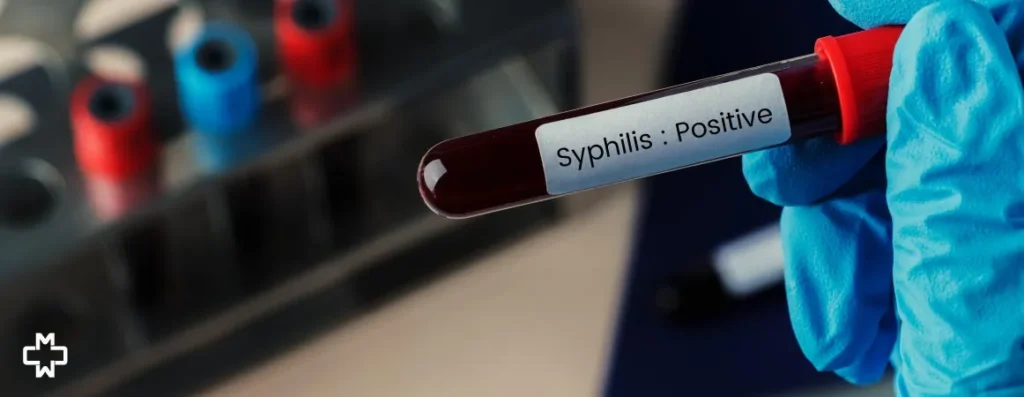Syphilis is a complex sexually transmitted infection (STI) caused by the bacterium Treponema pallidum. It is often called ”the great imitator” because many of its signs and symptoms cannot be distinguished from those of other infections.
How does syphilis spread?
Syphilis is passed from one person to another through direct contact with a syphilis sore during vaginal, anal, or oral sex. Sores occur mainly on or around the penis, vagina, or anus, or in the rectum, on the lips, or in the mouth. Pregnant women with the infection can pass it to the babies they are carrying.
It cannot be spread by toilet seats, swimming pools, sharing clothes, doorknobs, or utensils.
Risk factors for syphilis
You are at an increased risk of acquiring syphilis if you have:
- unprotected sex
- multiple sexual partners
- HIV
- are a man who indulges in sex with other men
What are the signs and symptoms of syphilis in adults?
Primary Stage
The time between syphilis infection and the start of the first symptoms can range from 10 to 90 days. Typically, the primary stage of syphilis is marked by the appearance of a small, painless sore called a chancre, but there can be several sores. It normally appears at the spot where syphilis enters the body. If it’s not treated, the infection progresses to the secondary stage.
Secondary stage
Second-stage syphilis symptoms are the following:
- rough red or reddish-brown rashes on palms and soles
- swollen lymph nodes
- fever
- sore throat
- patchy hair loss
- headaches and muscle aches
- extreme tiredness
The symptoms go away whether or not you get yourself treated. But if left untreated, your infection will get worse.
Latent syphilis
During the latent (hidden) stage, there are no visible signs or symptoms of syphilis. It remains in the body and may begin to damage your internal organs like the brain, eyes, heart, blood vessels, liver, and bones.
Tertiary stage
Tertiary syphilis is very serious and would occur 10 to 30 years after your syphilis infection started. It isn’t contagious at this point but the disease damages your internal organs and can result in death. Late-stage symptoms include problems controlling muscle movements, paralysis, numbness, vision problems, and dementia.
What complications can syphilis cause?
If left untreated, syphilis can cause damage throughout your body and even lead to death.
Small bumps called gummas can form throughout your body if you don’t get treated. You can get them on your skin, bones, liver or any other organ. Syphilis
Neurological problems: If untreated, syphilis can cause a number of problems with your nervous system, such as severe headaches, stroke, paralysis, dementia, and blindness.
Cardiovascular problems may include aneurysms and inflammation of the aorta and other blood vessels. Syphilis can also damage your heart valves.
HIV: If you have syphilis, you’re up to 5 times more likely to acquire HIV. This is because syphilis sores can be open, making it easier for HIV to get into your body during sex.
Can a newborn get syphilis?
An infected pregnant woman has a good chance of having a stillbirth or giving birth to a baby who dies shortly after birth. Babies born to moms who have syphilis can become infected through the placenta or during birth. Most babies with congenital syphilis don’t have symptoms, although some experience rashes on their palms and soles. Later, symptoms may include deafness, teeth deformities, and a saddle nose.
Is there a cure for syphilis?
Yes. A single dose of penicillin is recommended if you have had syphilis for less than a year. But, you may need larger doses if you’ve had it for more than one year.
There are no home remedies or over-the-counter drugs to cure syphilis.
How can you protect yourself against syphilis?
The only sure way to avoid sexually transmitted infections is to not have vaginal, anal, or oral sex.
If you’re sexually active, you can take the following preventive measures to reduce your risk of getting syphilis:
- Maintaining a long-term monogamous relationship with a partner who does not have syphilis
- Using a condom the right way every time you have sex, although it only protects against the sores covered by a condom and not those that develop elsewhere on the body
- Using dental dams, during oral sex
Treatment and care
Many people with STIs are not aware of it because most of the time there are no symptoms. So the only way to know for sure if you’re infected is to get tested.
If you’re sexually active or think you’re at risk, you can make an appointment with us at Manhattan Medical Arts for advice and treatment about protecting your sexual health in the future.
We believe in providing accessible, cost-effective, and efficient care that meets the expectations of our clients and strives to maintain the highest standards of safety and quality health care in all our facilities, for all our patients.
– Disclaimer –
This blog is for informational & educational purposes only, and does not intend to substitute any professional medical advice or consultation. For any health related concerns, please consult with your physician, or call 911.
Last reviewed by Dr. Syra Hanif, M.D. on 02/21/2020
Learn more about our editorial process.
-
About The Author
Dr. Syra Hanif M.D.Board Certified Primary Care Physician
Dr. Syra Hanif is a board-certified Primary Care Physician (PCP) dedicated to providing compassionate, patient-centered healthcare.
Read More


